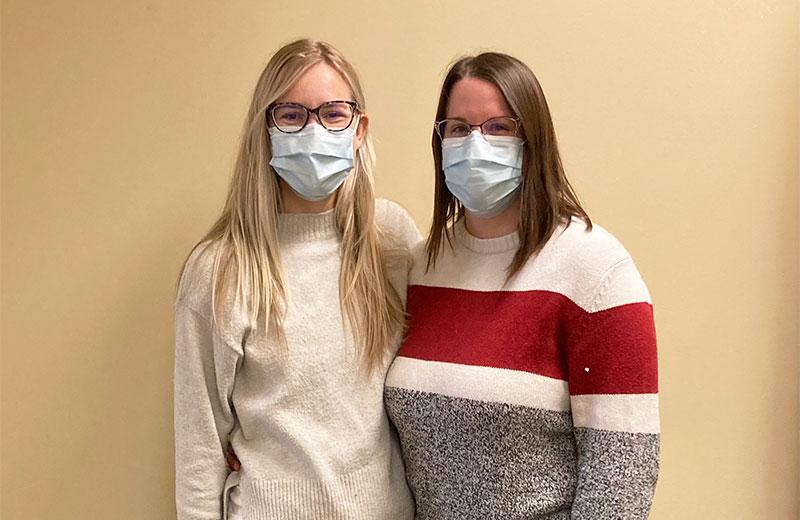October is National Occupational Therapy Month, where we highlight how occupational therapy can support people to stay safe at home! As part of our celebrations, we’ll be sharing a couple of stories to highlight occupational therapists from across the North. Take a journey with us and discover how occupational therapy can positively impact your life.
To start, we interviewed Desiree Lillico and Caitlin De Smit, two occupational therapists working in Fort St. John.
Tell us about your work
Desiree: I work in primary and community care as part of the health care team, supporting people in Fort St. John and the surrounding area. I’ve been working in my role for four years now.
Caitlin: I also work in primary and community care as part of the health care team, supporting people in Fort Nelson as well as Fort St. John and the surrounding area. I’ve been in my role for almost one year.
How would you describe your work as an occupational therapist?
Caitlin: Our role changes day to day. It keeps us on our toes which is why we like the job so much. Client referrals come from different sources including the medical clinic, health care team, community partners, the hospital, or self-referral. We work with all populations aged 18 and older.
Our focus is on home safety, independence, and community access, working within a holistic approach, to keep people in their home as long as possible. This may involve equipment recommendation, such as wheelchairs, bathroom equipment, etc., supporting with home adaptations, funding requests, mobility assessments, connecting clients to other community services, and functional assessments for activities of daily living or instrumental activities of daily living.
We see a variety of referrals, from mobility and fall related concerns, home and community accessibility, pressure injuries, mental health concerns, or lifestyle management to name a few.
What do you like about your role?
Desiree: I really enjoy the uniqueness of working with each individual. Each person’s occupations look different and interventions are adapted to their unique needs. It’s fun to work with and navigate the interventions for each person to help them meet their goals, pushing me to think outside the box to support them and what they need. The reward of giving clients back their independence is huge.
Caitlin: I love working in community because you work in peoples’ homes, which is where they feel the most safe and comfortable. Most people want to do whatever they can to stay home and so helping them achieve an extra month or year at home can be life-changing for them. I also love how they share with me their life story through their home, like their family photos, which helps build the relationship between us. It helps me to feel like I’m part of the community and on a team. Fort St. John is a small community and so something like helping set up a client with a scooter and then seeing them using it at the grocery store is so rewarding.
What impact does your role have on patients?
Desiree: We love this quote that we heard through a Concussion Awareness Training Tool education session we participated in:
“Occupational Therapists help the client return to activities. This could be something as simple as brushing your teeth or as complex as returning to work or school. I always like to say that OT is the skills for the job of living. So we help clients do all kinds of things to help them return to normal activities or adapt the activity to match their new difficulties they may be experiencing.” – Becky Moran, OT
Occupational therapy is about keeping clients safe at home, out of the hospital, and keeping them doing what they love to do.
Our roles have such a broad scope. All care is driven by the client’s goals and can be tailored based on our experience and what the client needs to get better. We approach their care from a holistic approach to support their needs.
What’s one thing about occupational therapy that you wish you could tell everyone?
We are not physiotherapists, although we are part of the rehabilitation team! We are also not just the “equipment ladies,” WE CAN DO SO MUCH MORE!
Occupational therapists are found in a lot of communities and settings. If you're having issues with activities of daily living, talk to your doctor to see if there's an occupational therapist in the community to support you. Most communities have them and they can be a free service if they're provided through Northern Health.














Comments